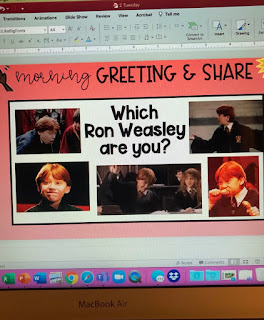I never blog as often as I want to, but I am always grateful to my former self when I capture my thoughts at a particular moment in time that I can revisit weeks, months, and years later.
This year has been no different in that respect, but with the added complication of nostalgia for practically everything from the “before times” as well. Yet, just like every other year before, this year it was only a matter of time before this class started to feel like my class. Over the past 14 weeks, my co-teacher and I have created an incredible little online community. I’ve had some of my favorite teaching moments, maybe ever, with this crew of kiddos. And in the last few weeks, in particular, virtual school has finally felt like school.

On Monday, I will go back to school in person with a small cohort of kiddos. Friends, family, and colleagues have been asking “how are you feeling about it?” And my best answer right now is “I'm feeling it all.” I’m equal parts anxious and curious and nervous and excited and terrified. I don’t know if it will feel like school when we’re all in masks and the desks are spread out and we can’t gather on the carpet for a read-aloud. But I know that we have re-created school before, which gives me hope that we can do it again. I'm also reminding myself that it takes time.
In 2014, I had one of my harder years of teaching (not nearly the hardest, I would come to find out). In November of that year, I blogged about finally feeling like my class was "my class". I’ve looked back at that post almost every year since to remind myself that it takes time to get to "that place." Without exception, every fall, I have nostalgia for my class from the previous year, for procedures running smoothly, for the routines and traditions we developed together.
 |
| A Tuesday Tradition for our Greeting |
On most days, the kiddos log into the programs we use for independent practice quickly and independently, and I am able to pull individuals into separate meetings for feedback or intervention. During small groups, I’ve tried a few different things, but have found ways to get students working on differentiated skills and even collaborating to solve problems. I’ve also created traditions, like the “Which ____ are you?” Greeting during Morning Meeting on Tuesdays (with gifs of popular characters) and our favorite Brain Breaks from UJU videos, which siblings and parents often join for. At the end of the day, when everyone unmutes to wave and there’s a chorus of byes, and “Have a great afternoon!” and “See you tomorrow!” it almost feels we’re together.

On Monday, I will go back to school in person with a small cohort of kiddos. Friends, family, and colleagues have been asking “how are you feeling about it?” And my best answer right now is “I'm feeling it all.” I’m equal parts anxious and curious and nervous and excited and terrified. I don’t know if it will feel like school when we’re all in masks and the desks are spread out and we can’t gather on the carpet for a read-aloud. But I know that we have re-created school before, which gives me hope that we can do it again. I'm also reminding myself that it takes time.










